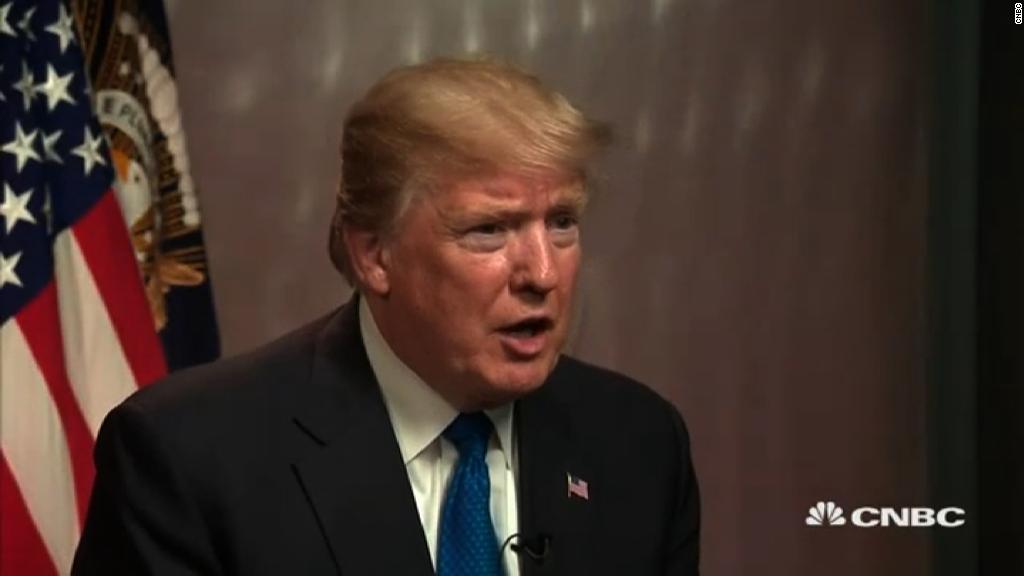
President Trump doesn't want investors to worry about the dollar.
"The dollar is going to get stronger and stronger, and ultimately I want to see a strong dollar," Trump said in an interview with CNBC on Thursday at the World Economic Forum in Davos, Switzerland.
The dollar's value quickly jumped 1% against other currencies.
A day earlier, the dollar hit its lowest point since 2014 after Treasury Secretary Steven Mnuchin suggested a weaker dollar is "good for trade."
Mnuchin also said there were both "benefits and issues" to a weaker dollar, and that the dollar's value is "not a concern of mine." But investors still sensed a departure from the U.S.'s traditional policy of backing a strong dollar.
Economics textbooks teach that a weaker currency can be a boon for growth because it makes a country's exports more competitive -- cheaper to buy. It can also reduce the trade deficit, a long-stated policy goal of the Trump administration.
Related: Steven Mnuchin is the British pound's new best friend
But a weaker dollar can also undermine confidence in other U.S. assets, including bonds.
Mnuchin tried to clarify his remarks on Thursday, saying the United States isn't concerned "where the dollar is in the short term."
Instead, he said those remarks were "balanced and consistent with what I've said before." He added, "in the long term, the dollar's strength reflects the U.S. economy."
Trump tried to defend his top finance official, telling CNBC that Mnuchin's comments were "taken out of context."
Treasury secretaries usually try not to introduce noise into financial markets.
They don't have control over the value of the dollar by setting interest rates -- the Federal Reserve does that. Nor do they have a lever that can push the dollar higher. But investors have always listened closely to what Treasury secretaries have to say about the U.S. currency.
"For whatever reason, financial markets care what the Treasury secretary says about the dollar," said David Wessel, director of the Hutchins Center for Fiscal and Monetary Policy at the Brookings Institution.
Mnuchin "said things that pushed the dollar down, whether he wanted to or not," Wessel said.
Related: Team Trump talks taxes, trade and the dollar in Davos
The dollar has shed 10% of its value since last year. Strong economic growth around the world has investors looking for alternatives to U.S. assets.
The government shutdown, the possibility of a future shutdown, and the threat of an eventual downgrade of the country's credit rating haven't helped, said Kathy Lien, a managing director of foreign exchange strategy for BK Asset Management.
She said Mnuchin's comment only weakened investor confidence.
"It's really exacerbated the problem," said Lien. "It reinforces the current market forces."
Weakness in the dollar also complicates the Federal Reserve's job. A weaker dollar can accelerate inflation because the currency is worth less. Faster inflation raises pressure on the Fed to hike interest rates more quickly.
Since the late 1990s, when Robert Rubin held the same job in the Clinton administration, Treasury secretaries have maintained the same mantra: A strong dollar is in the U.S. national interest.
That's why some Mnuchin's comments were viewed as such a departure.
Related: The economy is doing great. Here's what could derail it
"The secretary opened the door to [investors] wondering what does he really want," said Edwin Truman, a senior fellow at the Peterson Institute for International Economics and former assistant secretary for international affairs at the Treasury Department.
And even though Mnuchin tried to clarify his comments, Truman said, "markets don't hear it."
"Even if they understand the analysis, here is a Treasury secretary out there trying to talk down the dollar," he said.
The president of the European Central Bank, Mario Draghi, took a swipe at Mnuchin on Thursday for violating an agreement among countries not to start currency wars.
Draghi said Mnuchin's remarks didn't reflect "the terms that have been agreed" among major economies.
Finance chiefs from the 20 major economies, including the United States, Canada, Germany, Japan, Britain, France, and Italy, abide by an agreement to refrain from voicing their own opinions on their country's currency.
"This was a firing shot across Treasury's bow that if this is the beginning of a campaign to talk down the dollar, then we have big problems," said Truman of Draghi's response.
--CNNMoney's Matt Egan contributed to this report.


